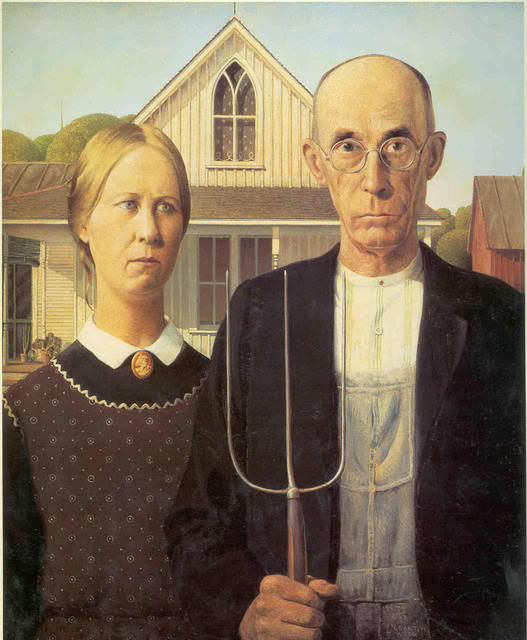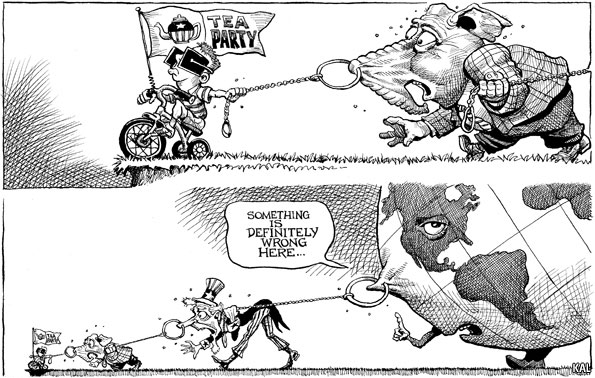
THE ECONOMIST: In America, for example, in 1987 the top 1% of taxpayers received 12.3% of all pre-tax income. Twenty years later their share, at 23.5%, was nearly twice as large. The bottom half’s share fell from 15.6% to 12.2% over the same period. Jan Pen, a Dutch economist who died last year, came up with a striking way to picture inequality. Imagine people’s height being proportional to their income, so that someone with an average income is of average height. Now imagine that the entire adult population of America is walking past you in a single hour, in ascending order of income. The first passers-by, the owners of loss-making businesses, are invisible: their heads are below ground. Then come the jobless and the working poor, who are midgets. After half an hour the strollers are still only waist-high, since America’s median income is only half the mean. It takes nearly 45 minutes before normal-sized people appear. But then, in the final minutes, giants thunder by. With six minutes to go they are 12 feet tall. When the 400 highest earners walk by, right at the end, each is more than two miles tall. MORE
NEW YORK TIMES: It has been three decades since the United States suffered a recession that followed on the heels of the previous one. But it could be happening again. The unrelenting negative economic news of the past two weeks has painted a picture of a United States economy that fell further and recovered less than we had thought. When what may eventually be known as Great Recession I hit the country, there was general political agreement that it was incumbent on the government to fight back by stimulating the economy. It did, and the recession ended. But Great Recession II, if that is what we are entering, has provoked a completely different response. Now the politicians are squabbling over how much to cut spending. After months of wrangling, they passed a bill aimed at forcing more reductions in spending over the next decade. If this is the beginning of a new double dip, it will have two significant things in common with the dual recessions of 1980 and 1981-82. In each case the first recession was caused in large part by a sudden withdrawal of credit from the economy. The recovery came when credit conditions recovered. And in each case the second recession began at a time when  the usual government policies to fight economic weakness were deemed unavailable. Then, the need to fight inflation ruled out an easier monetary policy. Now, the perceived need to reduce government spending rules out a more accommodating fiscal policy. MORE
the usual government policies to fight economic weakness were deemed unavailable. Then, the need to fight inflation ruled out an easier monetary policy. Now, the perceived need to reduce government spending rules out a more accommodating fiscal policy. MORE
TIME: Wall Street, it appears, hates the debt deal. Leading up to the debt-ceiling deadline, everyone was talking about how the stock market would crater if Washington didn’t reach a deal. In fact, the opposite has happened. Just when it became clear last week that Washington was moving closer to a deal is exactly when Wall Street started to stumble. And now that we have a deal, the falls have been getting worse. Thursday was particularly bad. The Dow Jones industrial average plunged more than 500 point. Overall, the market has fallen 9 out of the last 10 trading days, one of the worst stretches of down days in recent years. […] Some have said the fact that the debt deal was struck has allowed investors to focus more clearly on the economy, and what they see, now that they’re looking again, is bad news. But it’s more than just that. In the Aug. 15 issue of TIME, columnist Rana Foroohar argues that the debt deal will increase the level of inequality in the U.S. You can read her very good article here. I agree with Foroohar that it is bad news — and perhaps even worse than she makes it out. Inequality not only caused the financial crisis; it could make the recovery much slower. Here’s why:I have written a few pieces about how the debt deal could slow the economy. A cut in spending, be it from consumers or the government, during a recession is sure to cost the economy jobs. MORE
REUTERS: On Wall Street on Thursday, the Dow and the S&P 500 tumbled more than 4 percent and the Nasdaq lost 5 percent on fears that the world’s biggest economy is staring at another economic downturn. […] Friday’s U.S. jobs data could prove a make-or-break moment for global financial markets increasingly alarmed that the world’s largest economy could skid into a fresh recession. MORE
